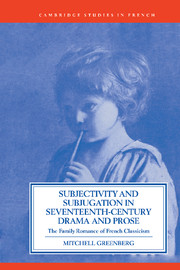 Subjectivity and Subjugation in Seventeenth-Century Drama and Prose
Subjectivity and Subjugation in Seventeenth-Century Drama and Prose Published online by Cambridge University Press: 16 October 2009
Le passé est le lieu d'intérêt et de plaisir qui situe hors des problèmes présents du prince, du côté de l'“opinion” et de la curiosité du public, la scène où l'historien joue son rôle de technicien-substitut du prince.
(M. de Certeau, L'Ecriture de l'histoire, p. 17)Although Corneille entered the tragic universe through the door of myth (Médée), his great tragedies, those plays that in his own time set him apart from his contemporaries as the creator of a new, powerful dramaturgy, are firmly rooted in history. Le Cid, Horace, Cinna and Polyeucte, despite the obvious differences in their plots and dramatic peripeteia, are all subtended by a historical imperative, a recourse to history as the impetus and motivation of tragic mimesis. In Corneille's plays the imbrication of history and tragedy forms a locus of overlapping, and at times contradictory, forces that circumscribe the emergence of the Classical subject. This subject, in turn, is implicated in the forms pleasure and power take in Cornelian dramaturgy as it reflects and traces the parameters of the nascent Absolutism of seventeenth-century France.
The Cornelian gesture of tragic “translation” from the universe of myth to the world of history is significant in its own right. Could we not see in this shift that initial move separating what J.M. Apostolidès has, following contemporary sociological discourse, described as the distinguishing feature of two types of societies, “those without history and those with access to historical understanding”?
To save this book to your Kindle, first ensure [email protected] is added to your Approved Personal Document E-mail List under your Personal Document Settings on the Manage Your Content and Devices page of your Amazon account. Then enter the ‘name’ part of your Kindle email address below. Find out more about saving to your Kindle.
Note you can select to save to either the @free.kindle.com or @kindle.com variations. ‘@free.kindle.com’ emails are free but can only be saved to your device when it is connected to wi-fi. ‘@kindle.com’ emails can be delivered even when you are not connected to wi-fi, but note that service fees apply.
Find out more about the Kindle Personal Document Service.
To save content items to your account, please confirm that you agree to abide by our usage policies. If this is the first time you use this feature, you will be asked to authorise Cambridge Core to connect with your account. Find out more about saving content to Dropbox.
To save content items to your account, please confirm that you agree to abide by our usage policies. If this is the first time you use this feature, you will be asked to authorise Cambridge Core to connect with your account. Find out more about saving content to Google Drive.